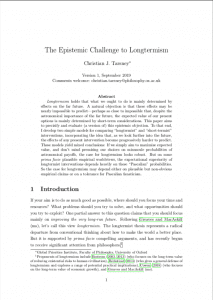The epistemic challenge to longtermism
Christian Tarsney (Global Priorities Institute, University of Oxford)
GPI Working Paper No. 3-2022, published in Synthese
Longtermists claim that what we ought to do is mainly determined by how our actions might affect the very long-run future. A natural objection to longtermism is that these effects may be nearly impossible to predict— perhaps so close to impossible that, despite the astronomical importance of the far future, the expected value of our present actions is mainly determined by near-term considerations. This paper aims to precisify and evaluate one version of this epistemic objection to longtermism. To that end, I develop two simple models for comparing ‘longtermist’ and ‘neartermist’ interventions, incorporating the idea that it is harder to make a predictable difference to the further future. These models yield mixed conclusions: if we simply aim to maximize expected value, and don’t mind premising our choices on minuscule probabilities of astronomical payoffs, the case for longtermism looks robust. But on some prima facie plausible empirical worldviews, the expectational superiority of longtermist interventions depends heavily on these ‘Pascalian’ probabilities. So the case for longtermism may depend either on plausible but non-obvious empirical claims or on a tolerance for Pascalian fanaticism.
Other working papers
Will AI Avoid Exploitation? – Adam Bales (Global Priorities Institute, University of Oxford)
A simple argument suggests that we can fruitfully model advanced AI systems using expected utility theory. According to this argument, an agent will need to act as if maximising expected utility if they’re to avoid exploitation. Insofar as we should expect advanced AI to avoid exploitation, it follows that we should expected advanced AI to act as if maximising expected utility. I spell out this argument more carefully and demonstrate that it fails, but show that the manner of its failure is instructive…
The asymmetry, uncertainty, and the long term – Teruji Thomas (Global Priorities Institute, Oxford University)
The Asymmetry is the view in population ethics that, while we ought to avoid creating additional bad lives, there is no requirement to create additional good ones. The question is how to embed this view in a complete normative theory, and in particular one that treats uncertainty in a plausible way. After reviewing…
In Defence of Moderation – Jacob Barrett (Vanderbilt University)
A decision theory is fanatical if it says that, for any sure thing of getting some finite amount of value, it would always be better to almost certainly get nothing while having some tiny probability (no matter how small) of getting sufficiently more finite value. Fanaticism is extremely counterintuitive; common sense requires a more moderate view. However, a recent slew of arguments purport to vindicate it, claiming that moderate alternatives to fanaticism are sometimes similarly counterintuitive, face a powerful continuum argument…

